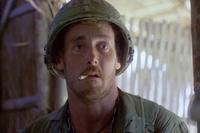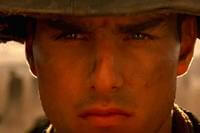Most Hollywood action movies cram in so much death and destruction that there isn't much room for character or plot development. If you watched the "Godzilla" trailers expecting it to tread the same path, you'll be happily disappointed with the result. "Godzilla" sets itself apart with good pacing, crisp action, and strong visual intelligence. But, the plot, characters, and a few cinematographic quirks knock it down a few steps from amazing.
The plot of "Godzilla" is unengaging and does a poor job of creating tension. From start to finish, the humans seem ancillary to the ancient, enormous animals duking it out. It could be argued that this plays into one of the major themes of the movie: man is powerless against nature despite our best efforts. However, the movie would have ended in just about the same way even if the human anti-giant monster task force hadn't been present, and that's a big problem. Rather than coming across as poetic or impactful, lack of human agency in "Godzilla" is frustratingly uninteresting.
One of the most disappointing aspects of "Godzilla" is its flat, boring characters. Brian Cranston does his best to deliver an energetic performance as Joe Brody, a scientist with something to prove, but an actor can only do so much with dialogue that's of dubious quality. At no point does "Godzilla" give you a solid reason to care about anyone other than Godzilla. The humans bumble about in precarious situations and hope for the best, but their struggles are hard to care about and they don't have much nuance. That isn't to say that the characters are terrible, it's just that all they do is move the plot along.
Considering all the serious one-liners in the film's trailers, viewers may have been expecting "Godzilla" to provide insightful meditation on man versus nature wrapped up in the excitement of a monster brawl. Unfortunately, the movie uses cheap quips in an attempt to provide thematic gravity to one of the most exciting pro-wrestling matches you'll ever see.
The visuals of the movie belie the quality of its plot and characters. One of the films saving graces is its ability to visually convey the sublime nature of each scene. This is where "Godzilla" derives the bulk of its value. The first scene is reminiscent of the start of "Jurassic Park" complete with a construction site, two scientists in pink and blue shirts, and intense discussion with a worried foreman. The adventure and amazement conveyed in those short minutes quickly gives way to a scene which could have been pulled from "Alien." While investigating an anamlous hole in the ground, scientists wander in hazmat suits over an enormous subterranean bone yard, and stumble upon a bio-mechanical looking structure oozing viscous gunk. The message early on is clear: "Godzilla" will take you on a thrilling adventure, but beneath that is the crippling horror of how powerless humanity is against nature.
The film's first arc builds artful visual evidence for what Ken Watanabe's character, Dr. Ichiro Serizawa, plainly states: "The arrogance of man is thinking nature is under our control, and not the other way around." This line is emobdied when Brian Cranston's character and his son, played by Aaron-Taylor-Johnson, wander through a city reclaimed by nature. Plants dominate the face of every building, wild dogs roam through the streets, and insects crawl over every facet of civilization.
The presence of the monsters is subdued compared to the glitz and adrenaline of other action movies, and this helps convey that they're products of our natural world that are wholly out of our control. When the first monster appears on screen, it makes no direct attempt to kill any humans, but inadvertently crushes a lot of them. "Godzilla" could have easily presented creatures focused on purposefully destroying humanity, but casting them as animals following their natural instincts is an enjoyably nuanced approach and helps build on the films themes.
The actual monster fights are a little overdramatic, but a whole lot awesome. The combat is always crisp, easy to follow, and uncluttered. The size and impact of the monsters themselves are conveyed in every punch and bite, and your jaw may even drop a few times. What muddles this experience is the director's insistence on slow, dramatic reveals and a handful of forced gotcha moments. When they work, they're highly effective, but they happen too frequently and may make you groan. Slowly panning upwards to reveal Godzilla's full size for the first time was perfectly executed, but the third or fourth moment a monster attacks from the fog or off-screen feels derivative.
If you're looking for an amazing cinematic experience this weekend, you shouldn't see Godzilla." But if you can forgive the bland parts, you'll be treated to gorgeous visuals and one of the best monster showdowns to grace the silver screen.














